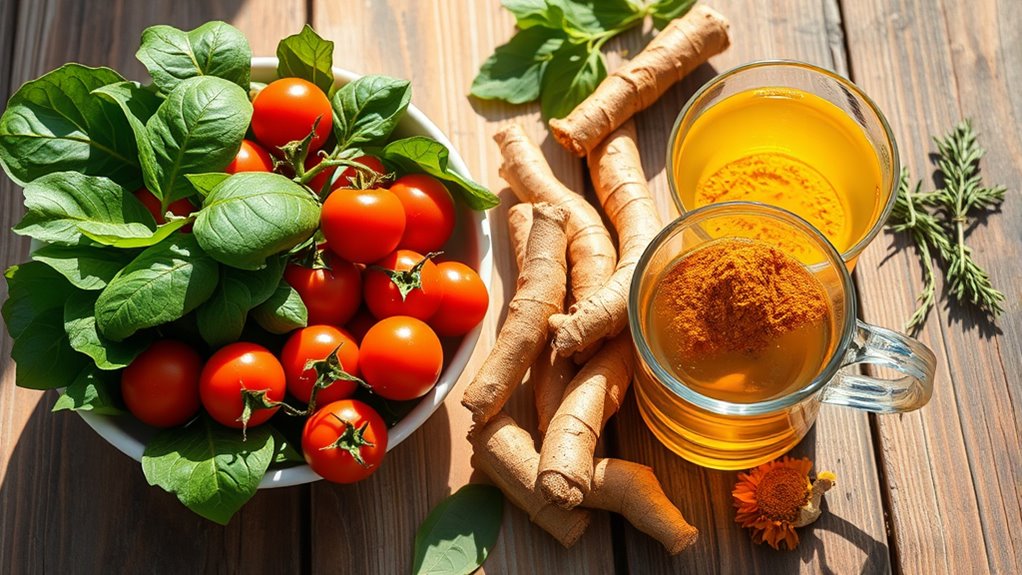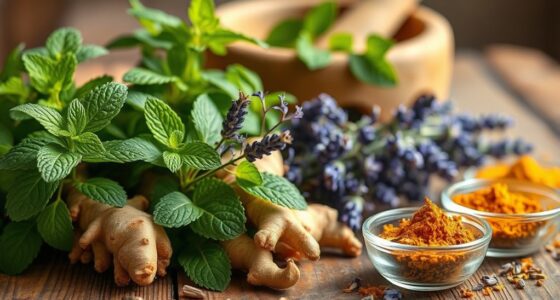Combining an anti-inflammatory diet with natural herbs enhances your body’s ability to fight chronic inflammation, which is linked to many health conditions. Eating antioxidant-rich foods, healthy fats, and whole grains, along with herbs like turmeric and ginger, creates powerful synergy that reduces swelling and pain. Using herbs boosts the effects of your foods, providing an extra layer of protection. If you want to discover how to maximize these benefits in your daily routine, keep exploring these options.
Key Takeaways
- Combining anti-inflammatory foods and herbs enhances their ability to reduce inflammation through synergistic effects.
- Herbs like turmeric and ginger contain bioactive compounds that complement anti-inflammatory dietary components.
- Pairing nutrient-rich foods with herbs amplifies antioxidant and enzyme-inhibiting properties, boosting overall inflammation reduction.
- A combined approach supports immune modulation, decreases cytokine production, and promotes better health outcomes.
- Integrating herbs with an anti-inflammatory diet makes healing meals more flavorful and empowering for health management.
Understanding Inflammation and Its Impact on Health
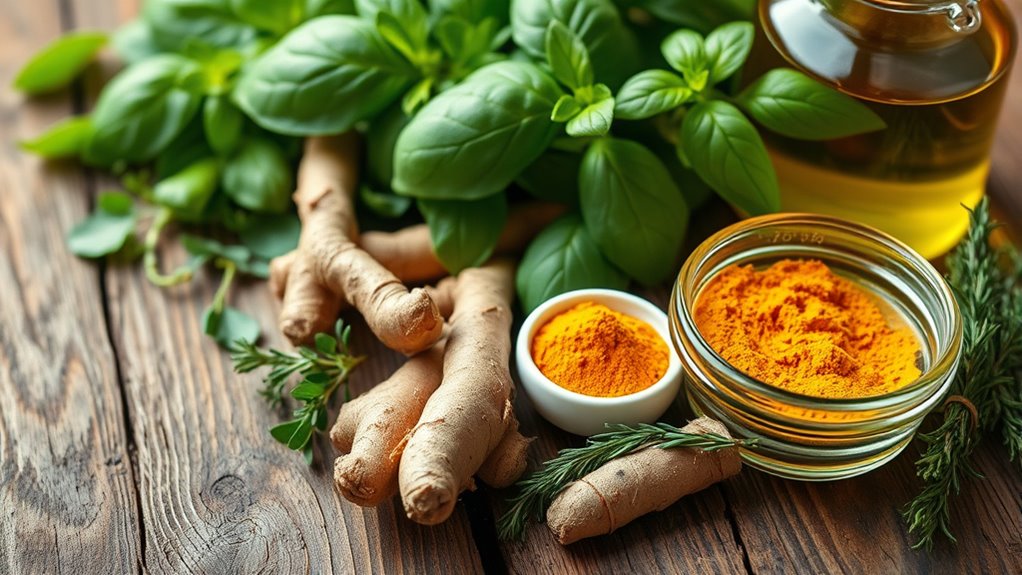
Inflammation is your body’s natural response to injury or infection, but when it becomes chronic, it can substantially harm your health. Persistent inflammation contributes to conditions like heart disease, diabetes, and arthritis. It occurs when your immune system stays activated longer than necessary, releasing chemicals that damage tissues. Factors such as poor diet, stress, lack of exercise, and environmental toxins can trigger ongoing inflammation. Over time, this can weaken your immune system and lead to serious illnesses. Recognizing the signs—like fatigue, pain, and swelling—helps you understand its impact. Managing inflammation involves more than just medication; it requires lifestyle changes to reduce triggers and promote overall health. Being aware of inflammation’s role empowers you to make choices that support your well-being.
Key Components of an Anti-Inflammatory Diet
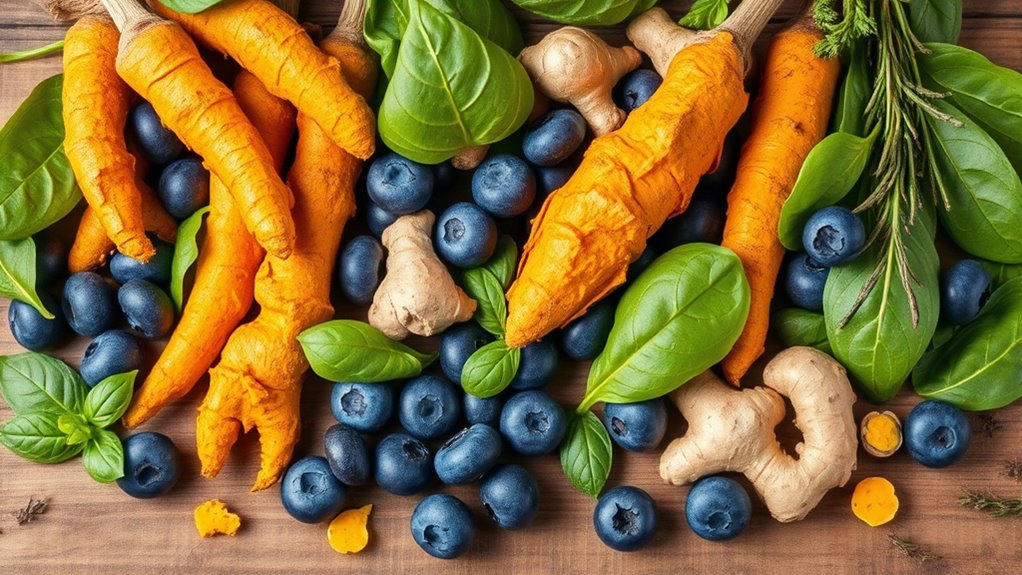
To effectively combat chronic inflammation, focusing on the key components of an anti-inflammatory diet is essential. You should prioritize foods rich in antioxidants, such as colorful fruits and vegetables, which help reduce oxidative stress. Incorporate healthy fats like omega-3 fatty acids found in fatty fish, flaxseeds, and walnuts, which can suppress inflammatory responses. Whole grains, such as oats and brown rice, provide fiber that supports gut health and inflammation control. Limit processed foods, refined sugars, and trans fats, as they promote inflammation. Spices like turmeric and ginger also play a crucial role in reducing inflammation. By choosing nutrient-dense, minimally processed foods, you’ll create a diet that actively fights inflammation and supports overall health.
Herbs With Natural Anti-Inflammatory Properties
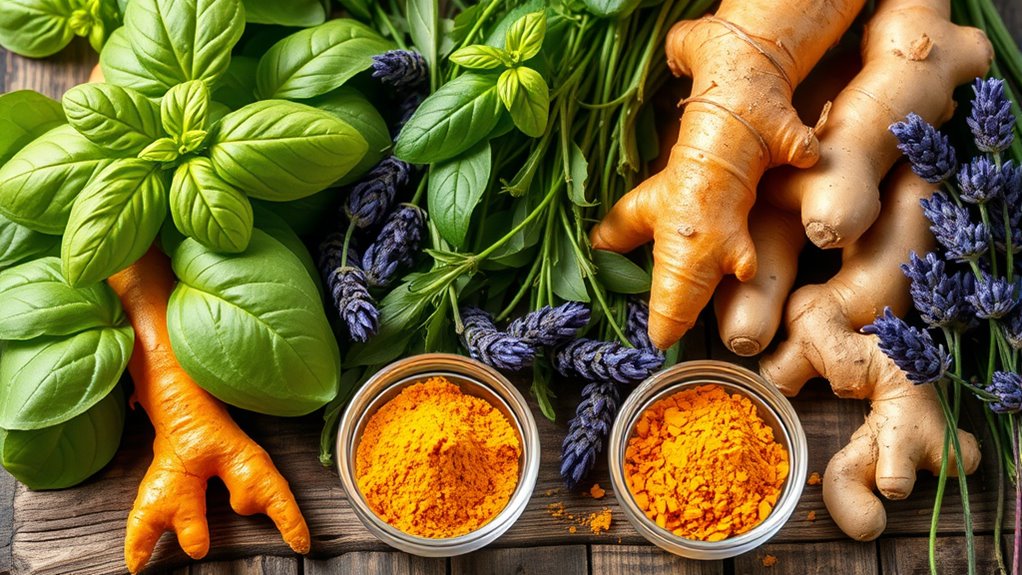
Herbs have long been valued not only for their flavor but also for their powerful natural compounds that help combat inflammation. Many herbs contain bioactive substances like polyphenols and flavonoids, which can reduce swelling and ease pain. For example, turmeric’s curcumin is well-known for its anti-inflammatory effects, while ginger acts similarly by blocking inflammatory pathways. Basil and rosemary also offer compounds that support your body’s natural defenses. Here’s a quick overview:
| Herb | Key Compound | Benefits |
|---|---|---|
| Turmeric | Curcumin | Reduces swelling, pain relief |
| Ginger | Gingerol | Combats inflammation |
| Basil | Eugenol | Anti-inflammatory, antioxidant |
| Rosemary | Carnosic acid | Protects cells, reduces swelling |
| Peppermint | Menthol | Soothes tissues, eases pain |
Incorporate these herbs into your meals to harness their natural anti-inflammatory power.
How Diet and Herbs Work to Reduce Inflammation
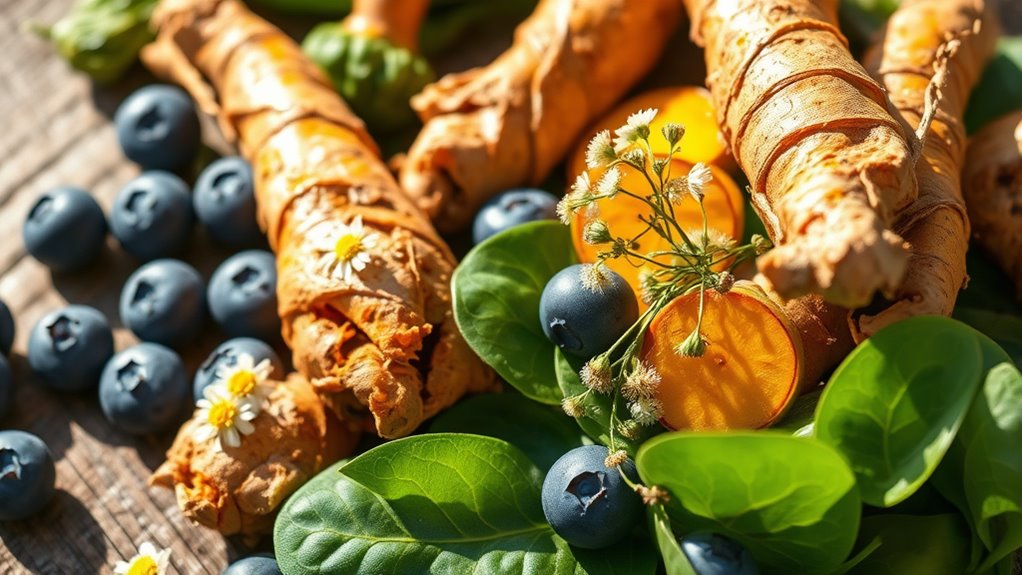
When you incorporate certain foods and herbs into your diet, they can actively help reduce inflammation by targeting the underlying processes that cause swelling and pain. Many anti-inflammatory foods contain compounds like antioxidants, polyphenols, and omega-3 fatty acids that neutralize free radicals and inhibit inflammatory enzymes. Herbs such as turmeric and ginger contain bioactive compounds that block pathways involved in inflammation, like COX and LOX enzymes. These substances work by modulating immune responses, reducing cytokine production, and decreasing cellular stress. When combined, diet and herbs create a multi-layered defense, interrupting the cycle of inflammation at different points. This synergy helps lower chronic inflammation, alleviating symptoms and supporting overall health. Your choice of foods and herbs directly influences how your body responds to inflammatory triggers.
Synergistic Effects of Combining Foods and Herbs
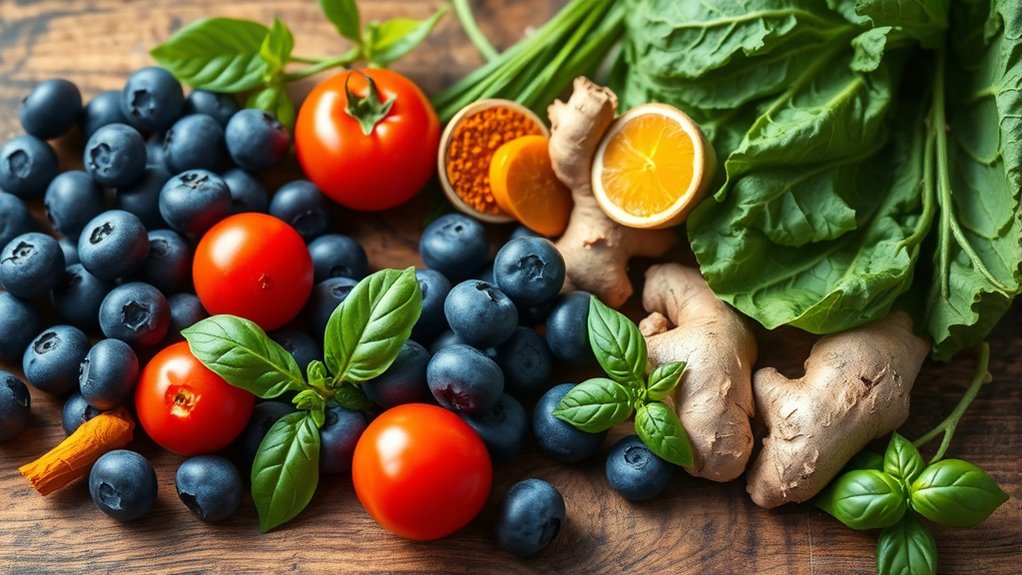
Combining anti-inflammatory foods and herbs can amplify their health benefits, creating a stronger defense against chronic inflammation. When you pair nutrient-rich foods like turmeric with herbs such as ginger, you enhance their effects, boosting your body’s ability to fight inflammation. These combinations can work synergistically, meaning their combined impact is greater than individual effects. Imagine feeling more energized, less sore, and healthier overall because you’re maximizing each meal’s potential. This strategy can make a real difference in your wellness journey.
- Feel empowered knowing you’re actively fighting inflammation with every bite
- Experience a sense of control over your health and well-being
- Discover the joy of creating flavorful, healing meals that nourish your body
- Celebrate small victories in your path toward better health
Practical Tips for Incorporating Anti-Inflammatory Choices Into Daily Life

Incorporating anti-inflammatory choices into your daily routine can be simple and enjoyable with some practical strategies. Start by adding colorful fruits and vegetables to your meals, and swap processed snacks for nuts or seeds. Planning your meals ahead helps guarantee you’re consistently choosing anti-inflammatory options. Using herbs like turmeric or ginger in cooking boosts flavor and benefits. Keep a variety of these ingredients visible in your kitchen to encourage regular use. To make it easier:
| Tip | Example |
|---|---|
| Prep in advance | Batch cook anti-inflammatory soups or stews |
| Use herbs daily | Add turmeric to your smoothies or teas |
| Snack smart | Replace chips with mixed nuts or berries |
| Read labels carefully | Choose products with fewer additives |
| Stay consistent | Incorporate small changes into every meal |
Small, consistent steps help make anti-inflammatory habits second nature.
Scientific Evidence Supporting Natural Anti-Inflammatory Strategies

Scientific research increasingly supports the use of natural anti-inflammatory strategies, demonstrating their effectiveness in reducing chronic inflammation and related health issues. Studies show that herbs like turmeric and ginger contain compounds that target inflammation at its source. Consuming anti-inflammatory foods has been linked to lower risks of heart disease, arthritis, and autoimmune conditions. Evidence also suggests that lifestyle changes, such as adopting a plant-based diet, can profoundly improve inflammatory markers. These findings empower you to take control of your health naturally.
Natural anti-inflammatory strategies backed by science can reduce inflammation and support your overall health.
- Feel the hope that comes with proven remedies rooted in nature.
- Experience relief as your body heals from within.
- Reclaim your vitality by choosing foods backed by science.
- Embrace a lifestyle that supports lasting wellness and peace.
Frequently Asked Questions
Can Anti-Inflammatory Diets Help Manage Autoimmune Diseases Effectively?
Yes, an anti-inflammatory diet can help manage autoimmune diseases effectively. By choosing foods rich in antioxidants, omega-3 fatty acids, and fiber, you reduce inflammation that worsens symptoms. Avoid processed foods and sugars that trigger flare-ups. Incorporating herbs like turmeric and ginger boosts this effect. While diet alone isn’t a cure, it supports your overall treatment plan, helping you feel better and potentially reducing the severity of symptoms.
Are There Any Potential Risks or Side Effects Using Herbs With Anti-Inflammatory Properties?
Yes, herbs with anti-inflammatory properties can have risks or side effects. You might experience allergic reactions, digestive issues, or interact with medications you’re already taking. It’s important to consult your healthcare provider before adding herbs to your routine. While herbs can boost your health, ignoring potential interactions could lead to complications. Always use herbs responsibly and in moderation to enjoy their benefits safely.
How Long Does It Typically Take to See Results From Dietary Changes?
You can start noticing improvements in inflammation and symptoms within a few days to a few weeks after making dietary changes. However, the timeline varies depending on your body’s response, the severity of inflammation, and consistency. Staying committed and incorporating anti-inflammatory foods regularly helps speed up results. Keep track of your progress, and remember that sustained habits yield the best long-term benefits.
Can Children or Pregnant Women Safely Follow an Anti-Inflammatory Diet?
Children and pregnant women can usually follow an anti-inflammatory diet safely, but you should consult healthcare providers first. They can guarantee the diet meets nutritional needs and avoids potential allergens or harmful ingredients. Focus on whole foods, fruits, vegetables, lean proteins, and healthy fats. Avoid processed foods, excessive sugar, and additives. With proper guidance, you support their health and reduce inflammation effectively.
Are There Specific Herbs More Effective for Certain Types of Inflammation?
Certain herbs target specific inflammation types more effectively. For example, turmeric is renowned for reducing joint inflammation, making it great for arthritis. Ginger helps with muscle soreness and digestive inflammation. Boswellia may ease chronic inflammatory conditions like rheumatoid arthritis. You should consider your specific symptoms and consult a healthcare provider to choose herbs best suited for your needs, ensuring safe and effective use tailored to your inflammation type.
Conclusion
By embracing an anti-inflammatory diet, incorporating healing herbs, and making mindful choices, you can reduce inflammation and improve your health. Combining nutritious foods with beneficial herbs enhances your body’s defenses, supports overall well-being, and fosters resilience. When you prioritize fresh, wholesome ingredients and natural remedies, you empower your body to heal, protect, and thrive. Ultimately, your commitment to these simple, synergistic habits creates a healthier, happier life—because when you nourish your body wisely, you transform your health.

